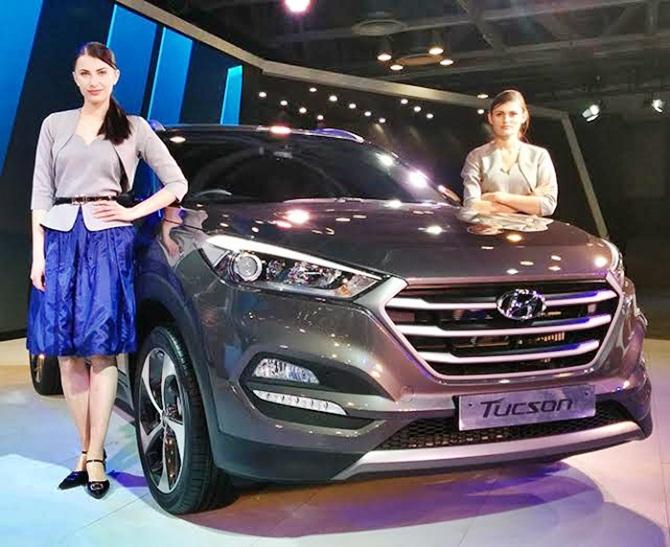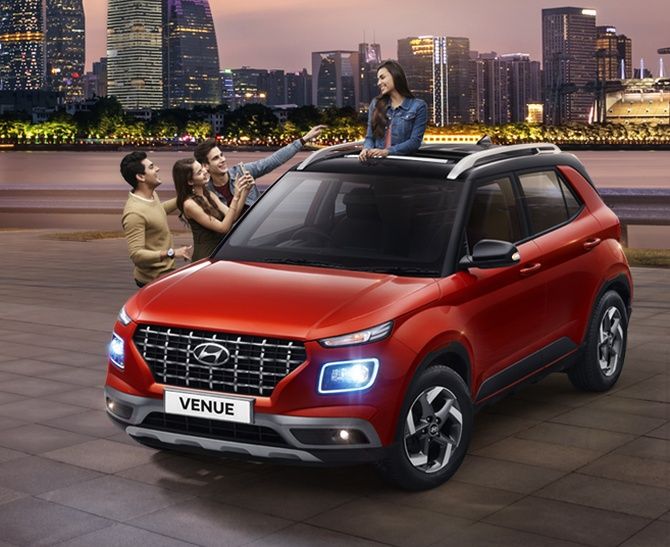If last year's performance is any indicator, its strategy is clearly utility vehicle (UV)-driven. The next two years will see at least four more UVs hit the road, with a combination of variants and a new smaller SUV, writes Pavan Lall.

Korean car-maker Hyundai Motor India, which has been a steady runner-up to market leader Maruti Suzuki, says volumes -- especially in the smaller car segments -- won't be its future focus.
But sport utility vehicles (SUVs) will lead the future charge. This is a segment the company is funnelling money to as it sees its market share grow.
With a total investment of Rs 24,000 crore to date and another Rs 7,000 crore planned for the next five years, Hyundai fills a consumer vacuum between Maruti Suzuki and premium cars.
If last year's performance is any indicator, its strategy is clearly utility vehicle (UV)-driven. The next two years will see at least four more UVs hit the road, with a combination of variants and a new smaller SUV.

Hyundai Motor India's Managing Director and Chief Executive Officer S S Kim says, "The firm's vision is to be a lifetime partner in automobiles and beyond," implying the company will not just look at customers but also at alternative mobility offerings that include taxi aggregator Ola (Hyundai invested Rs 2,000 crore in it) and subscription-based mobility firm Revv.
Despite the market losing traction and most original equipment manufacturers seeing volumes decline sharply, Hyundai increased its market share by 1.5 per cent, registering 17.4 per cent market share for the year-to-date 2019 (January–September 2019).
According to the industry data, Hyundai's SUV sales accounted for 24 per cent of the 524,000 vehicles sold.
That's being driven largely by the Venue, Creta, and the Tucson, pushing sales of around 123,000 units.
At the same time, Hyundai has sold around 378,000 cars, of which its SUVs account for 32 per cent.
Puneet Anand, group head-marketing, Hyundai, says, "We want to be leaders in three areas: Connected, shared, and green mobility."
In other words, cars that are internet-linked, mobility platforms that can be shared by younger drivers, and electric cars. "We don't want to be seen as a carmaker, but as a maker of future mobility technology."

Sector analysts say that being the choice of aspirational consumers is the route Hyundai has chosen.
"Though Hyundai is not really aiming to overtake Maruti in the volume game, it does plan to be the preferred brand when a majority of the entry-segment customers upgrade in future, matching aspirations for features, technology, safety, and convenience," says Suraj Ghosh, principal analyst for IHS Markit Powertrain & Compliance Forecasting.
Ghosh also says that Maruti's decision to exit from diesel cars after the implementation of Bharat Stage VI regulations will cause further correction in maintaining its market share in the months ahead. This may mean easier sales growth for others.
Also driving the change in market share is the shrinking 'A' segment, where Maruti Suzuki is reigning supreme.
With 42,681 units in the five-month period (May-September 2019), Hyundai Venue is currently the hottest-selling UV in India.
In addition, there have been over 300 bookings for the Kona Electric UV, of which, 177 units have actually been delivered, say Hyundai officials.
Does that mean the company will pull out from hatchbacks and sedans? Officials say they will retain those vehicles, but the market is increasingly skewed towards SUVs -- this is where the margins and its focus will be.
But if there are two things it could change to help the car business, what would they be? Kim says Hyundai's plans are in place to realise the country's vision of shared, connected, and zero-emission mobility. "Hyundai is well-equipped to deliver on that," he adds.












 © 2025
© 2025